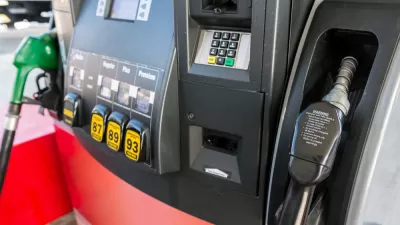Walker had supported increasing the gas tax and user fees last November, but now that he's being taken as a serious contender for the Republican nomination for president, he's changed his transportation funding preference to increased bonding.
Gov. Scott Walker's new transportation funding plan calls for increasing debt service while forsaking a pay-as-you go approach based on raising user taxes and fees, an abrupt change from what his transportation secretary had proposed in November. The governor "leads a big, tightly packed field of potential contenders in a new Des Moines Register/Bloomberg Politics Iowa Poll of likely Republican caucusgoers," according to The Des Moines Register.
"The [governor's transportation] plan, released (Jan. 30) to the Milwaukee Journal Sentinel, comes after Walker has spent more than a year calling for finding new long-term solutions for funding transportation," writes of the Journal Sentinel. Relying on transportation bonds is not viewed as a long-term solution.
The plan will allow Walker to tout his opposition to raising taxes as he considers a possible run for president. But the increased reliance on borrowing to fund highways may not go over well with his fellow Republicans who control the Legislature.
Last November, his transportation secretary had proposed increasing the gas tax, largely by restructuring it to a wholesale sales tax, and increasing registration fees, i.e., creating a long-term financing plan based on increased user fees.
Roads are funded largely with gas taxes and vehicle registration fees. Paying past debt takes up about 19% of the state money that flows into the transportation fund each year. That percentage would rise under Walker's plan, though [Walker's] office did not provide specifics.
The new plan ignores the recommendation of his own transportation commission, which "recommended raising the state's gas tax by five cents and creating a mileage-based registration fee for drivers," wrote Kris Maher of The Wall Street Journal in February 2013. "Drivers would report their odometer readings when renewing their registration each year and pay a fee based on how many miles they drove."
Hat tip to AASHTO Daily Transportation Update.
FULL STORY: Walker bypasses gas tax hike, wants $1.3 billion in transportation bonds

Planetizen Federal Action Tracker
A weekly monitor of how Trump’s orders and actions are impacting planners and planning in America.

Congressman Proposes Bill to Rename DC Metro “Trump Train”
The Make Autorail Great Again Act would withhold federal funding to the system until the Washington Metropolitan Area Transit Authority (WMATA), rebrands as the Washington Metropolitan Authority for Greater Access (WMAGA).

The Simple Legislative Tool Transforming Vacant Downtowns
In California, Michigan and Georgia, an easy win is bringing dollars — and delight — back to city centers.

In These Cities, Most New Housing is Under 441 Square Feet
With loosened restrictions on “micro-housing,” tiny units now make up as much as 66% of newly constructed housing.

Albuquerque’s Microtransit: A Planner’s Answer to Food Access Gaps
New microtransit vans in Albuquerque aim to close food access gaps by linking low-income areas to grocery stores, cutting travel times by 30 percent and offering planners a scalable model for equity-focused transit.

This City Will Pay You to Meet Your Neighbors
A North Kansas City grant program offers up to $400 for residents to throw neighborhood block parties.
Urban Design for Planners 1: Software Tools
This six-course series explores essential urban design concepts using open source software and equips planners with the tools they need to participate fully in the urban design process.
Planning for Universal Design
Learn the tools for implementing Universal Design in planning regulations.
Smith Gee Studio
City of Charlotte
City of Camden Redevelopment Agency
City of Astoria
Transportation Research & Education Center (TREC) at Portland State University
US High Speed Rail Association
City of Camden Redevelopment Agency
Municipality of Princeton (NJ)




























